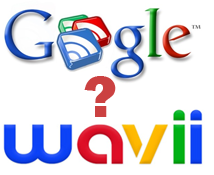- Share Is the next Google Reader Replacement the recently acquired Wavii? on Facebook
- Share Is the next Google Reader Replacement the recently acquired Wavii? on Twitter
- Share Is the next Google Reader Replacement the recently acquired Wavii? on Linkedin
- Share Is the next Google Reader Replacement the recently acquired Wavii? via email
There has been much buzz in the past few days about Google’s acquisition of Wavii for about $30M. Just a month prior, many were upset by another announcement from Google that they are killing Google Reader as of July 1st. Upon closer inspection of Wavii, there are a lot of functional similarities between Wavii and Google Reader causing some to speculate that these announcements are related and that Wavii may in fact be part of Google’s Reader alternative.
 It’s no secret that Google Reader has been reduced to step-child status from Google’s perspective despite its immense popularity. In the past few years, Google has let Reader languish and in fact tried to killed Google Reader once before back in 2011 leading to the Occupy Reader movement. As a result, Google has not kept up with times with its feed reader offering and has fallen behind.
It’s no secret that Google Reader has been reduced to step-child status from Google’s perspective despite its immense popularity. In the past few years, Google has let Reader languish and in fact tried to killed Google Reader once before back in 2011 leading to the Occupy Reader movement. As a result, Google has not kept up with times with its feed reader offering and has fallen behind.
It’s plausible that Wavii may be Google’s attempt at leap-frogging to the present to replace Reader for a few reasons:
-
Mobile first. Google Reader was created initially for desktop devices years before the advent of smart phones and tablets. Since then, Google Reader has built user-friendly interfaces for these devices. These days, most Google Reader users consume content on mobile devices as opposed to the desktop interface. That being said, Google Reader always will have a lot of legacy baggage to carry since they started with the desktop first, and the mobile experience as an add-on.
What Wavii has to offer: On the other hand, the new generation of news consumption apps such as Wavii were designed for the mobile experience first. Google has a lot to gain be reinventing their news consumption model by building a great mobile experience first, followed by a desktop experience for more involved and complex tasks.
-
Topics over Feeds. In Google Reader’s model, a user subscribes to specific feeds from a single source. Similarly, Google Reader’s discover model is also based on feeds to follow which are recommended to you.
What Wavii has to offer: In comparison, Wavii uses Named Entity Recognition (NER) technology to identify topics such as people, organizations and locations mentioned in the news which you can then follow. Topics are more intuitive and powerful than feeds alone because as humans we naturally think of topics that we are interested in and less about feeds. Topics are very memorable whereas cryptic feed URLs are not. It’s a lot easier to answer the question “What topics are you interested in?” as compared to “What feeds do you subscribe to?” While Google does use entity recognition in Google News, they have not applied that technology for personalized content consumption and Wavii has a lot to offer here.
-
Feedback. Google Reader has little or no learning mechanism to incorporate feedback from the user’s preferences to make the reading experience better in the future. At most you can mark as read, star or share times in Google Reader, but this does not make your content consumption experience better going forward.
What Wavii has to offer: Wavii has feedback mechanisms built in so users can tell the app what content they like and dislike. While some have criticized it, Wavii’s strange smiley icon based feedback mechanism, it at least has one, where as Google Reader has none.
-
Social. Google Reader does not have a strong social component. It’s not easy to browse what your friends are following, and what content they like. While many have speculated that the demise of Google Reader was motivated by Google’s desire to incorporate it’s functionality into their social product Google+, at the present Reader has virtually no social story.
What Wavii has to offer: On the flipside, Wavii has a strong social component where you can browse what topics are users are following, and similarly share what topics you are following as well. Google has a lot to gain from incorporating a similar framework.
While it’s not clear that Wavii is Google’s replacement for their Reader product, it is apparent that there are a number of functionality areas where Wavii far outpaces Google Reader. At the least, we should expect that Google will incorporate some of these concepts into the next evolution of Google Reader.
Disclaimer: As a disclaimer, my company Curata is actively working on a Google Reader replacement that incorporates some of these concepts. We are currently giving only 10,000 early invites at this time. If you are interested, you can sign up for an invite to our Google Reader alternative here.




